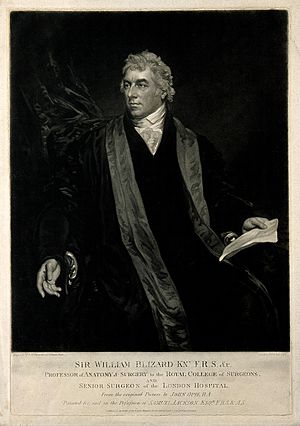William Blizard facts for kids
Quick facts for kids
Sir
William Blizard
|
|
|---|---|

Sir William Blizard. Mezzotint by S. W. Reynolds
|
|
| Born | 1 March 1743 Barn Elms, Surrey
|
| Died | 27 August 1835 (aged 92) Brixton Hill, London
|
| Resting place | Norwood Cemetery |
| Nationality | British |
| Occupation | Surgeon |
Sir William Blizard (born March 1, 1743 – died August 27, 1835) was a very important English surgeon. He was known for his work in medicine and for helping to start a medical school.
Contents
William Blizard's Early Life
Sir William Blizard was born in a place called Barn Elms in Surrey, England. He was the fourth child in his family. His father, also named William Blizard, worked as an auctioneer.
When he was young, William Blizard learned about medicine by working with a surgeon and apothecary (a type of pharmacist) in Mortlake. After this, he went to study at the famous London Hospital. There, he learned from two very skilled surgeons, Sir Percivall Pott and John Hunter.
A Career in Medicine
In 1780, William Blizard became a surgeon at the London Hospital. He was very dedicated to teaching others. In 1785, he and Dr. McLaurin started a medical school there. He even used his own money to help build it!
Sir William also gave medical advice to the public. He would hold special meetings at Batson's Coffee House in Cornhill. He was so respected that he even became the surgeon for the Duke and Duchess of Gloucester, who were members of the royal family.
Important Roles and Honors
Sir William Blizard was elected as a member of the Royal Society in 1787. This is a very old and respected group for scientists. He taught surgery and anatomy at the Royal College of Surgeons for twenty years. He was even the president of this college twice, in 1814 and 1822. He also gave special speeches called Hunterian Orations three times.
In 1803, he was given the title of "Sir," which means he was knighted by the King. This was a great honor for his work.
He also helped start the Hunterian Society in 1819 and was its first president. This society was named after his teacher, John Hunter.
Helping Others
Sir William Blizard cared about people's well-being. He spoke out against child labor, especially in the cotton factories. He believed that young children should not have to work in such difficult conditions.
Later Life and Legacy
For the last 13 years of his life, Sir William Blizard lived in Brixton Hill. He passed away at the age of 92 in 1835. He was first buried in a church vault, but later his remains were moved to Norwood Cemetery.
His nephew, Thomas Blizard, also became a surgeon. Another relative, Thomas Blizard Curling, was his great-nephew and also a well-known surgeon.
Today, a building at Whitechapel is named the Blizard Building in his honor. It is a modern medical research center.
 | Jewel Prestage |
 | Ella Baker |
 | Fannie Lou Hamer |

